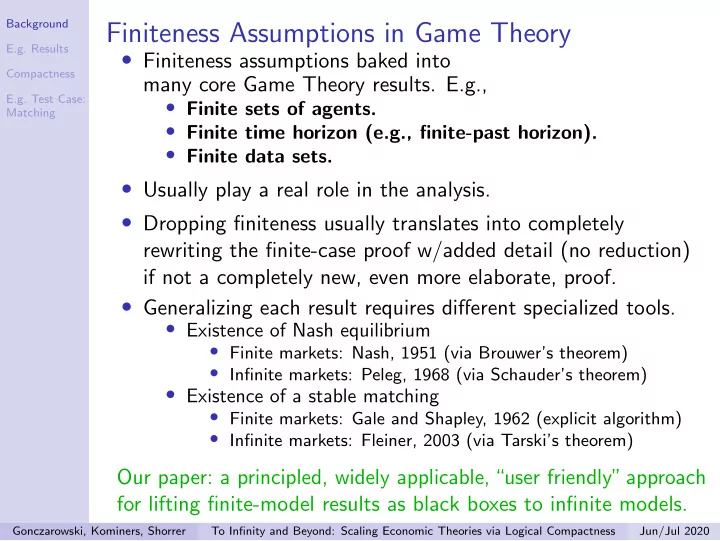

Background Finiteness Assumptions in Game Theory E.g. Results • Finiteness assumptions baked into Compactness many core Game Theory results. E.g., E.g. Test Case: • Finite sets of agents. Matching • Finite time horizon (e.g., finite-past horizon). • Finite data sets. • Usually play a real role in the analysis. • Dropping finiteness usually translates into completely rewriting the finite-case proof w/added detail (no reduction) if not a completely new, even more elaborate, proof. • Generalizing each result requires different specialized tools. • Existence of Nash equilibrium • Finite markets: Nash, 1951 (via Brouwer’s theorem) • Infinite markets: Peleg, 1968 (via Schauder’s theorem) • Existence of a stable matching • Finite markets: Gale and Shapley, 1962 (explicit algorithm) • Infinite markets: Fleiner, 2003 (via Tarski’s theorem) Our paper: a principled, widely applicable, “user friendly” approach for lifting finite-model results as black boxes to infinite models. Gonczarowski, Kominers, Shorrer To Infinity and Beyond: Scaling Economic Theories via Logical Compactness Jun/Jul 2020
Background Some Existence Results, and Challenges E.g. Results Infinitely many agents Compactness • Stable matching E.g. Test Case: • Finite markets: Gale and Shapley, 1962 Matching Reproved • Infinite markets: Fleiner, 2003 (via Tarski’s theorem) • Strategyproofness in infinite markets ? (Open: Jagadeesan, 2018) New • Lone wolf thm doesn’t hold ⇒ new approach needed if in fact true. • Lift variant existence results ? (Not DA based. . . proof via Tarski unlikely.) New • Walrasian equilibrium in trading networks (substitutable prefs.) • Finite networks: Hatfield et al., JPE, 2013 New • Infinite networks ? (Finite-network proof delicate, complex as it is.) Infinite past horizon • Dynamic stable matching with tenure • Finite start, infinite future-horizon (Pereyra, 2013, tweaked DA) • Infinite past-horizon ? New • No “men-optimal” stable matching. . . GS/DA-style proof unlikely. Infinite observed data sets — Revealed-preference theory • Rationalizability of finite demand datasets (GARP): Afriat, 1967 Reproved • Infinite demand datasets: Reny, ECMA, 2015 (new elaborate proof) • Lift other rationalizability results ? (e.g., McFadden and Richter, 1971) ? New • Existing generalizations assume added structure or weaken rationalizability. Gonczarowski, Kominers, Shorrer To Infinity and Beyond: Scaling Economic Theories via Logical Compactness Jun/Jul 2020
Background Propositional Logic 101: Logical Compactness E.g. Results • Define a set of Boolean variables —“facts about our solution” Compactness E.g. Test Case: • E.g., { matched ( m , w ) } ∀ m , w Matching • E.g., { price ( o , p ) } ∀ o , p / { consumes ( a , o ) } ∀ a , o • The set of well-formed propositional formulae is defined inductively: • All atomic formulae—the variables defined above, • ‘ ¬ φ ’ for every well-formed formula φ , • ‘( φ ∨ ψ )’, ‘( φ ∧ ψ )’, ‘( φ → ψ )’, and ‘( φ ↔ ψ )’ for every two well-formed formulae φ and ψ . E.g., ‘ matched ( ˜ w ) ’, ‘ matched ( m , w ′ ) ∨ matched ( m ′ , w ) ’, m , ˜ ‘ ¬ ( matched ( m , w ) ∧ matched ( m , w ′ ) )’. (Each formula always finite!) • A model is an assignment of (Boolean) truth values to the variables. The truth value of formulae in a model is defined inductively. The Compactness Theorem for Propositional Logic A set of formulae is satisfiable (i.e., ∃ model where all these formulae are TRUE) if and only if every finite subset thereof is satisfiable. Gonczarowski, Kominers, Shorrer To Infinity and Beyond: Scaling Economic Theories via Logical Compactness Jun/Jul 2020
Background Instructive Example: Existence of a Stable Matching E.g. Results • Women W , men M , each specifies n th choice spouse, ∀ n . Compactness • Matching : 1-to-1 between (some) women and (some) men. E.g. Test Case: • A matching is blocked by a pair ( m , w ) if m prefers w to his Matching match and w prefers m to her match. Stable if not blocked. • Not a continuum model! Infinitely many nonnegligible players. • Gale and Shapley, 1962: always exists in finite markets. A compact, logical proof for infinite markets, by reduction � � Formulae over the variables m ∈ M , w ∈ W : matched ( m , w ) • matched ( m , w ) → ¬ matched ( m , w ′ ) ∀ m , w � = w ′ ; • matched ( m , w ) → ¬ matched ( m ′ , w ) ∀ m � = m ′ , w ; • ¬ matched ( m , w ) ∀ m , w not mutually ranked; • ¬ matched ( m , w ) → � ( matched ( m , w 1 ) ∨ · · · ∨ matched ( m , w l ) ) ∨ � Finite formula! ∨ ( matched ( m 1 , w ) ∨ · · · ∨ matched ( m k , w ) ) ∀ m , w where w 1 , . . . , w l ≻ m w and m 1 , . . . , m k ≻ w m . Compactness ⇒ enough to satisfy every finite formula set. Every finite subset satisfiable by existence in finite markets. Gonczarowski, Kominers, Shorrer To Infinity and Beyond: Scaling Economic Theories via Logical Compactness Jun/Jul 2020
Recommend
More recommend